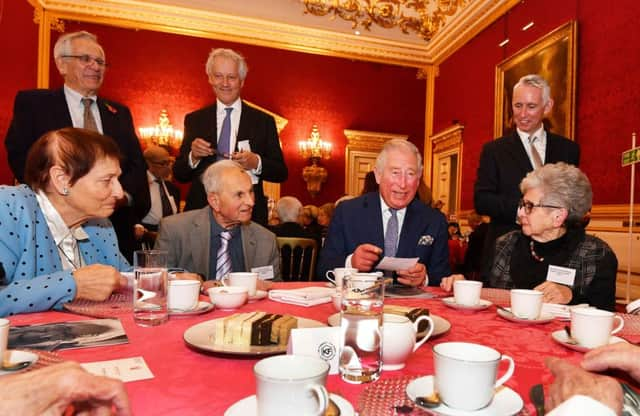Charles meets the children who fled from Nazis


The portent had come just a few days earlier and the evidence was still strewn on the streets. In what became known as Kristallnacht – the night of broken glass –Hitler’s paramilitary troops had systematically smashed the windows of Jewish-owned shops, buildings, and synagogues. Some 30,000 men were taken away to concentration camps.
As the news and the fear spread, few MPs were surprised when, on November 21, 1938, the Home Secretary, Samuel Hoare, told them that almost every German parent who had been asked, had wanted their children to flee to Britain without them.
Advertisement
Hide AdAdvertisement
Hide AdYesterday at Clarence House, Prince Charles led the anniversary commemoration of the Kindertransport initiative.
“I hope people have learned lessons,” he said to the former refugees, now in their 80s and 90s. “I think what you all have gone through is astonishing.”
He listened as they recalled leaving their families behind. Fewer than half would see their parents again.
“I can never get over your stories,” said Charles, who is patron of the Holocaust Memorial Day Trust. He was encouraged, he added, that so many now visited schools to talk about their experiences so they are never forgotten.
Advertisement
Hide AdAdvertisement
Hide AdThe Kindertransport brought some 10,000 children aged between three and 17 from Germany, Austria, Czechoslovakia and Poland. The first party of nearly 200 arrived in Harwich three weeks after Kristallnacht. But it was a narrow window that closed less than a year later, when the Prime Minister declared war on Germany.
It had been five days after Kristallnacht that Neville Chamberlain had received a delegation of British, Jewish and Quaker leaders who beseeched him to allow the temporary admission of unaccompanied children. They would return home when the danger passed.
Among the “safe houses” to which they were sent was a hostel in Parkfield Road, in Bradford’s Manningham district. It became the Carlton Hotel, and today is a hostel once more, for those in drug rehabilitation.
Yesterday, husband and wife Bob and Ann Kirk, aged 13 and 10 respectively, when they came separately to Britain, were among those to speak to Charles.
Advertisement
Hide AdAdvertisement
Hide AdMr Kirk, 93, said: “I think they call it the 40-year syndrome. We never used to talk about what it was like on Kindertransport. We did not speak about it in the Blitz or long after. Now we keep talking about it.”
Mrs Kirk, 90, said Charles took a “very serious” interest in the Kindertransport. She thought it may be because his grandmother, Princess Alice of Battenberg, saved the lives of Jews in Nazi-occupied Athens by hiding them during the war.
The Prince also met Herman Rothman, 94, who was 15 when he arrived in Britain from Berlin a week before the war broke out.
He went on to work for British intelligence, was an interrogator and also one of the people to translate Hitler’s will. He said Charles was “very interested” in his work for the British.